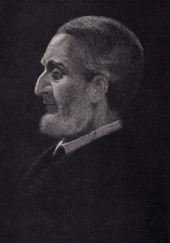Benjamin Wills Newton
| Benjamin Wills Newton | |
|---|---|
 |
|
| Born | 12 December 1807 Plymouth, England |
| Died | 26 June 1899 Tunbridge Wells, England |
| Occupation | evangelist, writer |
Benjamin Wills Newton, (12 December 1807 – 26 June 1899) was an English evangelist and author of Christian books. He became the most notable leader of the church in Plymouth after which the Plymouth Brethren were named. Although he had been a close friend of John Nelson Darby, they began to clash on matters of church doctrine and practice which led to the 1848 split of the brethren movement into the Open Brethren and Exclusive Brethren and Newton's withdrawal.
Newton was born in Davenport near Plymouth, Devon in a Quaker family. His father died shortly before Benjamin was born. Newton had no siblings. He studied at Exeter College, Oxford, where he obtained a 1st Class Classics degree in 1828 and became a fellow of the college.
At Oxford he abandoned Quaker beliefs and joined the Anglican Church. He was friends of Francis William Newman and George Wigram. Through Newman he first met John Nelson Darby. Newton and his friends in Oxford became increasingly critical of the Anglican Church especially in regard to its subjection to the sovereign state and the appointment of ordained clergy. In December 1831 Wigram left the Anglican church and bought a nonconformist place of worship, Providence Chapel in Raleigh Street, Plymouth, Devon. Meetings were open to Christians from all denominations for fellowship, prayer, praise and communion. In January 1832, Newton and Darby, although at the time, both Anglican clerics, shared communion with Wigram at such a meeting.
By March 1832 Newton had left the Anglican Church, committed himself to the new fellowship and married a local girl, Hannah Abbott. The “Providence People” as they were known locally, grew quickly, became known as “The Brethren from Plymouth” and then were referred to as the Plymouth Brethren. Around 1832 Darby also left the Anglican Church of Ireland.
The predominant features of the Plymouth assembly in 1832 included:
...
Wikipedia
